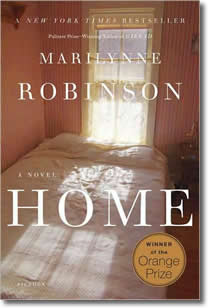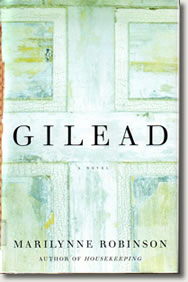The Makings of a Prodigal Son
Exploring questions of forgiveness and sin in Marilynne Robinson's books Gilead and Home
Farrar, Straus, Giroux, New York, 2004, 2008
 When 40-year-old Jack Boughton, the central and tragic figure in both of these novels, tips his hat one last time to his sister, Glory, smiles sadly, and walks wearily away from his ancestral home of Gilead, Iowa, readers yearn for him to stop, turn around and return to the embrace of his loving, devout family. But he will not. He cannot. For Jack can never be at home in Gilead or anywhere else this side of eternity.
When 40-year-old Jack Boughton, the central and tragic figure in both of these novels, tips his hat one last time to his sister, Glory, smiles sadly, and walks wearily away from his ancestral home of Gilead, Iowa, readers yearn for him to stop, turn around and return to the embrace of his loving, devout family. But he will not. He cannot. For Jack can never be at home in Gilead or anywhere else this side of eternity.
If you have ever wondered how the parable of the Prodigal Son would end if the wayward son could not fully accept his father’s grace, these two novels will show you. If you’ve ever thought that the devoted father of the Prodigal Son must surely have struggled to forgive his younger son, these novels will confirm it. Gilead and Home reverse the joyful ending of that most well known of Jesus’ parables. They show in achingly honest detail how difficult it is for human families to fulfill Jesus’ parabolic homecoming. We know the banquet is possible, but how hard it is to realize among one’s own flesh and blood.
Each book tells the same story from a different point of view. Gilead, the 2005 Pulitzer prize winner for fiction, introduces us to the seemingly safe world of small town Gilead, Iowa. The narrator is Rev. John Ames, a 76-year-old congregational minister with heart problems who writes letters to his 7-year-old son. The elderly minister, who lost his first wife and daughter in childbirth, is astonished at his good fortune to have a family so late in life. “I’d never have believed I’d see a wife of mine doting on a child of mine. It still amazes me every time I think of it. I’m writing this in part to tell you that if you ever wonder what you’ve done in your life . . . you have been God’s grace to me, a miracle.” Like the biblical character Simeon beholding the baby Jesus, the aging Ames prepares to depart life in peace.
But this is not simply a story of an aging father who is grateful for his young son and wife. Ames’s story is paralleled by another, darker one, that features Ames’s best friend, Rev. Jack Boughton, a retired Presbyterian minister and patriarch of a family of seven grown children. Boughton’s youngest son, Jack, is the favored child and prodigal son. This story is told in Home by Jack’s sister, Glory. After an unsuccessful, protracted romance, she returns to Gilead to care for her aging father and to attempt to reconcile the wayward Jack and the stubborn, principled father.
Despite Glory’s best attempts to bring together father and son, something always stands between them. They each blame themselves. There is alcohol addiction on Jack’s part, and a child born out of wedlock in his adolescent years that Rev. Boughton attempted to care for but could not save. Jack spends time in prison for unnamed crimes. And Jack’s current wife, an African American, has given birth to a son that Jack cannot even tell his father about. As Jack sees it, “I really am nothing. Nothing with a body. I create a kind of displacement around myself as I pass through the world, which can fairly be called trouble. This is a mystery, I believe. It’s why I keep to myself. When I can.”
On the other hand, the loving father believes the fault rests within himself. He was either too lenient or too harsh with Jack. Only wanting to communicate love, he repeatedly offends Jack. After one failed attempt to demonstrate concern, the father laments, “No, no, it isn’t how I wanted things to be. I promised myself a thousand times, if you came home you would never hear a word of rebuke from me.” But rebuke is mainly what Jack hears from his father, whom he cannot please.
Glory sums up the irresolvable family conflict at the heart of these luminous stories – stories about families shot through with grace but marred by human failure. “That old illusion that she could help her father with the grief Jack caused, the grief Jack was, when it was as far beyond her power to soothe or mitigate as the betrayal of Judas Iscariot . . . He was himself. That is what their father had always said, and by it had meant that Jack was jostled along in the stream of their vigor and purpose and their good intentions, their habits and certitudes, and was never really a part of any of it.”
Jack is at bottom, inexplicably, a loner within the wide world. Born among a loving and close family in a near idyllic small town, he is drawn to mischief and crime with a seeming indifference to its effects upon those he loves. When he comes home to try to make amends, the gap is too great. The circuits of compassion and forgiveness are twisted and torn. Neither he nor they can make the connection. When he leaves Gilead again, Rev. Ames blesses him, which only heightens the sadness of Jack “having invested hope” and the “cost to him of relinquishing it.”
To say that Marilynne Robinson’s novels are exquisitely attuned to religious questions is an understatement. Throughout Gilead and Home, this gifted writer explores the nature of human sin and the cost of human forgiveness. What drives us to hurt those we most love? To abandon our own most cherished values and withhold ourselves from those who most care for us? Is it possible to set ourselves beyond the reach of human love and divine redemption for reasons that we cannot possibly comprehend? How can one human being embody both gentle beauty and willful meanness all at the same time? Are we ultimately responsible for our own incomprehensible, destructive actions, or is there an unseen hand at work (God?) behind even our darkest impulses? These are the questions that thrum through Robinson’s books. They remain with us long after we turn the last page.
If you are like me, the beauty of these stories will make you sigh for Gilead, for home. A place with swings hanging from the trees near the river, where people play “catch of an evening” and “hear the train pass.” They will also make you weep, because no matter how much you want it, no matter how good you have been or not, the lasting joy of home is just beyond reach. The restful porch awaits, but you cannot stay, cannot fully rest, as John Ames says at the end of Gilead, “until the great and general incandescence.”
Copyright © 2010 G. Lee Ramsey
Help explorefaith.org when you purchase a copy of HOME or GILEAD from amazon.com.
